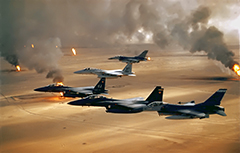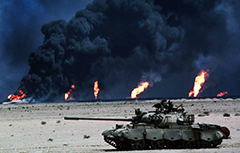The Gulf War (2 August 1990 – 28 February 1991), codenamed Operation Desert Shield (2 August 1990 – 17 January 1991) for operations leading to the buildup of troops and defense of Saudi Arabia and Operation Desert Storm (17 January 1991 – 28 February 1991) in its combat phase, was a war waged by coalition forces from 35 nations led by the United States against Iraq in response to Iraq's invasion and annexation of Kuwait.
 The war is also known under other names, such as the Persian Gulf War, First Gulf War, Gulf War I, Kuwait War, First Iraq War or Iraq War, before the term "Iraq War" became identified instead with the 2003 Iraq War. The Iraqi Army's occupation of Kuwait that began 2 August 1990 was met with international condemnation and brought immediate economic sanctions against Iraq by members of the UN Security Council. Together with the UK's prime minister Margaret Thatcher — who had resisted the invasion by Argentina of the Falkland Islands a decade earlier — George H. W. Bush deployed US forces into Saudi Arabia, and urged other countries to send their own forces to the scene. An array of nations joined the coalition, forming the largest military alliance since World War II. The great majority of the coalition's military forces were from the US, with Saudi Arabia, the United Kingdom and Egypt as leading contributors, in that order. Kuwait and Saudi Arabia paid around US$32 billion of the US$60 billion cost.
The war is also known under other names, such as the Persian Gulf War, First Gulf War, Gulf War I, Kuwait War, First Iraq War or Iraq War, before the term "Iraq War" became identified instead with the 2003 Iraq War. The Iraqi Army's occupation of Kuwait that began 2 August 1990 was met with international condemnation and brought immediate economic sanctions against Iraq by members of the UN Security Council. Together with the UK's prime minister Margaret Thatcher — who had resisted the invasion by Argentina of the Falkland Islands a decade earlier — George H. W. Bush deployed US forces into Saudi Arabia, and urged other countries to send their own forces to the scene. An array of nations joined the coalition, forming the largest military alliance since World War II. The great majority of the coalition's military forces were from the US, with Saudi Arabia, the United Kingdom and Egypt as leading contributors, in that order. Kuwait and Saudi Arabia paid around US$32 billion of the US$60 billion cost.
The war was marked by the introduction of live news broadcasts from the front lines of the battle, principally by the US network CNN. The war has also earned the nickname Video Game War after the daily broadcast of images from cameras on board US bombers during Operation Desert Storm.
 The initial conflict to expel Iraqi troops from Kuwait began with an aerial and naval bombardment on 17 January 1991, continuing for five weeks. This was followed by a ground assault on 24 February. This was a decisive victory for the coalition forces, who liberated Kuwait and advanced into Iraqi territory. The coalition ceased its advance and declared a ceasefire 100 hours after the ground campaign started. Aerial and ground combat was confined to Iraq, Kuwait, and areas on Saudi Arabia's border. Iraq launched Scud missiles against coalition military targets in Saudi Arabia and against Israel.
The initial conflict to expel Iraqi troops from Kuwait began with an aerial and naval bombardment on 17 January 1991, continuing for five weeks. This was followed by a ground assault on 24 February. This was a decisive victory for the coalition forces, who liberated Kuwait and advanced into Iraqi territory. The coalition ceased its advance and declared a ceasefire 100 hours after the ground campaign started. Aerial and ground combat was confined to Iraq, Kuwait, and areas on Saudi Arabia's border. Iraq launched Scud missiles against coalition military targets in Saudi Arabia and against Israel.
The cost of the war to the United States was calculated by the US Congress in April 1992 to be $61.1 billion (equivalent to $96.5 billion in 2016). About $52 billion of that amount was paid by other countries: $36 billion by Kuwait, Saudi Arabia and other Arab states of the Persian Gulf; $16 billion by Germany and Japan (which sent no combat forces due to their constitutions). About 25% of Saudi Arabia's contribution was paid in the form of in-kind services to the troops, such as food and transportation. US troops represented about 74% of the combined force, and the global cost was therefore higher. More details
 The war is also known under other names, such as the Persian Gulf War, First Gulf War, Gulf War I, Kuwait War, First Iraq War or Iraq War, before the term "Iraq War" became identified instead with the 2003 Iraq War. The Iraqi Army's occupation of Kuwait that began 2 August 1990 was met with international condemnation and brought immediate economic sanctions against Iraq by members of the UN Security Council. Together with the UK's prime minister Margaret Thatcher — who had resisted the invasion by Argentina of the Falkland Islands a decade earlier — George H. W. Bush deployed US forces into Saudi Arabia, and urged other countries to send their own forces to the scene. An array of nations joined the coalition, forming the largest military alliance since World War II. The great majority of the coalition's military forces were from the US, with Saudi Arabia, the United Kingdom and Egypt as leading contributors, in that order. Kuwait and Saudi Arabia paid around US$32 billion of the US$60 billion cost.
The war is also known under other names, such as the Persian Gulf War, First Gulf War, Gulf War I, Kuwait War, First Iraq War or Iraq War, before the term "Iraq War" became identified instead with the 2003 Iraq War. The Iraqi Army's occupation of Kuwait that began 2 August 1990 was met with international condemnation and brought immediate economic sanctions against Iraq by members of the UN Security Council. Together with the UK's prime minister Margaret Thatcher — who had resisted the invasion by Argentina of the Falkland Islands a decade earlier — George H. W. Bush deployed US forces into Saudi Arabia, and urged other countries to send their own forces to the scene. An array of nations joined the coalition, forming the largest military alliance since World War II. The great majority of the coalition's military forces were from the US, with Saudi Arabia, the United Kingdom and Egypt as leading contributors, in that order. Kuwait and Saudi Arabia paid around US$32 billion of the US$60 billion cost.The war was marked by the introduction of live news broadcasts from the front lines of the battle, principally by the US network CNN. The war has also earned the nickname Video Game War after the daily broadcast of images from cameras on board US bombers during Operation Desert Storm.
 The initial conflict to expel Iraqi troops from Kuwait began with an aerial and naval bombardment on 17 January 1991, continuing for five weeks. This was followed by a ground assault on 24 February. This was a decisive victory for the coalition forces, who liberated Kuwait and advanced into Iraqi territory. The coalition ceased its advance and declared a ceasefire 100 hours after the ground campaign started. Aerial and ground combat was confined to Iraq, Kuwait, and areas on Saudi Arabia's border. Iraq launched Scud missiles against coalition military targets in Saudi Arabia and against Israel.
The initial conflict to expel Iraqi troops from Kuwait began with an aerial and naval bombardment on 17 January 1991, continuing for five weeks. This was followed by a ground assault on 24 February. This was a decisive victory for the coalition forces, who liberated Kuwait and advanced into Iraqi territory. The coalition ceased its advance and declared a ceasefire 100 hours after the ground campaign started. Aerial and ground combat was confined to Iraq, Kuwait, and areas on Saudi Arabia's border. Iraq launched Scud missiles against coalition military targets in Saudi Arabia and against Israel.The cost of the war to the United States was calculated by the US Congress in April 1992 to be $61.1 billion (equivalent to $96.5 billion in 2016). About $52 billion of that amount was paid by other countries: $36 billion by Kuwait, Saudi Arabia and other Arab states of the Persian Gulf; $16 billion by Germany and Japan (which sent no combat forces due to their constitutions). About 25% of Saudi Arabia's contribution was paid in the form of in-kind services to the troops, such as food and transportation. US troops represented about 74% of the combined force, and the global cost was therefore higher. More details
